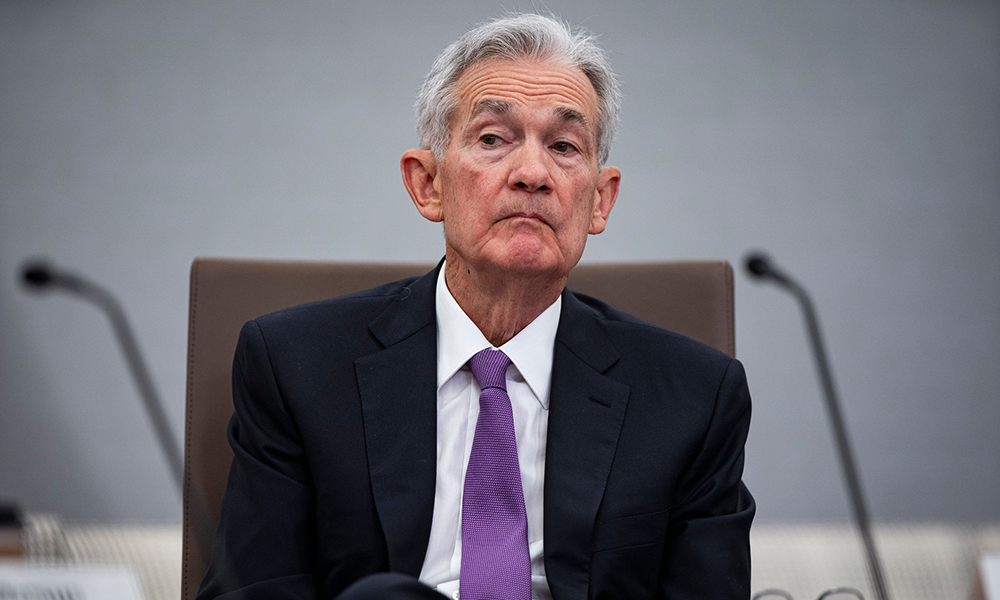德意志银行调查发现,接近一半投资者预计美国经济“不着陆”

一年前,大多数投行和华尔街投资者预测,由于持续性通胀和加息的影响,美国将陷入经济衰退。在2023年3月彭博社的一项调查中,约65%的经济学家认为,美国经济会在12个月内陷入严重衰退。但随着美国消费者和企业在过去一年证明了他们的韧性,华尔街的知名分析师们几乎已经放弃了对于经济衰退的预测。甚至有越来越多人开始质疑所谓“软着陆”的可能性。软着陆是指通胀下降,但经济增长疲软,这一直被视为是除了经济衰退以外,另外一种显而易见的结果。
德意志银行(Deutsche Bank)3月份的“全球市场调查”(Global Markets Survey)显示,现在有45%的投资者认为,美国经济将进入“不着陆”的情境,即通胀始终略高于美联储2%的目标,但经济增长依旧强劲。在德意志银行的调查中,有38%的受访者依旧预测美国经济将会“软着陆”,但只有17%的受访者预测经济衰退或“硬着陆”——这与一年前经济学家们的预期相比有明显转变。
在此之前,1月和2月的两份消费物价指数报告高于预期,让一些投资者对持续性通胀的威胁和更加鹰派的美联储政策感到担忧,但美联储主席杰罗姆·鲍威尔却对这两份报告不予理会。鲍威尔在3月20日的新闻发布会上对记者表示,高于预期的通胀报告“并没有真正改变整体趋势,即通胀正在沿着一条崎岖的道路,逐步朝着2%的目标前进。”
在美联储主席的发言之后,德意志银行的全球经济与主题研究负责人吉姆·里德描述了许多投资者的新“不着陆”预期。
周一,他在写给客户的电子邮件中表示:“因此,可以说[这是]一种含蓄的、适度的‘不着陆’预测,即经济飞速增长,但央行不会采取更强硬的政策,而市场对目前更温和的政策表示欢迎。”
里德认为,投资者对于“不着陆”情境对市场的意义是否过于乐观,只有“时间能告诉我们答案”,但他分析了为什么许多投资者会如此乐观。
基本上,投资者预测的通胀率略高于通胀目标,这对于股市而言通常是坏消息,因为这预示着更高的利率,或者至少降息次数将少于此前的预测。但里德认为,这一次,美联储没有理会最近高于预期的通胀报告,而且经济增长证明了其韧性,因此美国经济在短期内仍将处在一个适宜的“金发姑娘地带”。这位资深华尔街投资者表示,上周鲍威尔发言之后,美国股市经历了2024年表现最好的一周,因为美联储似乎“非常确信其有能力在6月降息,尽管最近通胀水平有所升高”。
即使投资者提高了通胀预测,市场依旧表现出色的另外一个原因可能是,投资者相信美联储愿意忽视消费物价的小幅上涨。里德指出,47%的受访者认为“美联储应该忍受通胀长期高于目标水平”。
目前投资者更担心的似乎是通胀而不是经济衰退,而且他们似乎并不担心如果通胀卷土重来,美联储会采取更激进的措施破坏市场。因此,在德意志银行的调查中,只有13%的受访者表示,预计今年美国会陷入经济衰退,而三个月前这个比例还高达59%。
但依旧有许多专家无法预测美国经济的未来,这预示着2024年是美国经济充满不确定性的一年。约19%的受访者表示“不知道”美国的下一次经济衰退会在什么时候发生,而在一年前这个比例只有3%。(财富中文网)

翻译:刘进龙
审校:汪皓
一年前,大多数投行和华尔街投资者预测,由于持续性通胀和加息的影响,美国将陷入经济衰退。在2023年3月彭博社的一项调查中,约65%的经济学家认为,美国经济会在12个月内陷入严重衰退。但随着美国消费者和企业在过去一年证明了他们的韧性,华尔街的知名分析师们几乎已经放弃了对于经济衰退的预测。甚至有越来越多人开始质疑所谓“软着陆”的可能性。软着陆是指通胀下降,但经济增长疲软,这一直被视为是除了经济衰退以外,另外一种显而易见的结果。
德意志银行(Deutsche Bank)3月份的“全球市场调查”(Global Markets Survey)显示,现在有45%的投资者认为,美国经济将进入“不着陆”的情境,即通胀始终略高于美联储2%的目标,但经济增长依旧强劲。在德意志银行的调查中,有38%的受访者依旧预测美国经济将会“软着陆”,但只有17%的受访者预测经济衰退或“硬着陆”——这与一年前经济学家们的预期相比有明显转变。
在此之前,1月和2月的两份消费物价指数报告高于预期,让一些投资者对持续性通胀的威胁和更加鹰派的美联储政策感到担忧,但美联储主席杰罗姆·鲍威尔却对这两份报告不予理会。鲍威尔在3月20日的新闻发布会上对记者表示,高于预期的通胀报告“并没有真正改变整体趋势,即通胀正在沿着一条崎岖的道路,逐步朝着2%的目标前进。”
在美联储主席的发言之后,德意志银行的全球经济与主题研究负责人吉姆·里德描述了许多投资者的新“不着陆”预期。
周一,他在写给客户的电子邮件中表示:“因此,可以说[这是]一种含蓄的、适度的‘不着陆’预测,即经济飞速增长,但央行不会采取更强硬的政策,而市场对目前更温和的政策表示欢迎。”
里德认为,投资者对于“不着陆”情境对市场的意义是否过于乐观,只有“时间能告诉我们答案”,但他分析了为什么许多投资者会如此乐观。
基本上,投资者预测的通胀率略高于通胀目标,这对于股市而言通常是坏消息,因为这预示着更高的利率,或者至少降息次数将少于此前的预测。但里德认为,这一次,美联储没有理会最近高于预期的通胀报告,而且经济增长证明了其韧性,因此美国经济在短期内仍将处在一个适宜的“金发姑娘地带”。这位资深华尔街投资者表示,上周鲍威尔发言之后,美国股市经历了2024年表现最好的一周,因为美联储似乎“非常确信其有能力在6月降息,尽管最近通胀水平有所升高”。
即使投资者提高了通胀预测,市场依旧表现出色的另外一个原因可能是,投资者相信美联储愿意忽视消费物价的小幅上涨。里德指出,47%的受访者认为“美联储应该忍受通胀长期高于目标水平”。
目前投资者更担心的似乎是通胀而不是经济衰退,而且他们似乎并不担心如果通胀卷土重来,美联储会采取更激进的措施破坏市场。因此,在德意志银行的调查中,只有13%的受访者表示,预计今年美国会陷入经济衰退,而三个月前这个比例还高达59%。
但依旧有许多专家无法预测美国经济的未来,这预示着2024年是美国经济充满不确定性的一年。约19%的受访者表示“不知道”美国的下一次经济衰退会在什么时候发生,而在一年前这个比例只有3%。(财富中文网)
翻译:刘进龙
审校:汪皓
Just a year ago, most investment banks and Wall Street investors were forecasting a U.S. recession due to the impact of persistent inflation and higher interest rates. Some 65% of economists polled by Bloomberg in March 2023 were convinced the U.S. economy was headed for a serious downturn within 12 months. But with U.S. consumers and businesses proving their resilience over the past year, Wall Street’s top minds have mostly abandoned their recession predictions. Even what was long considered to be the obvious alternative to a recession—a so-called “soft landing” where inflation fades, but economic growth is weak—is increasingly in doubt.
Instead, 45% of investors now believe the U.S. economy is headed for a “no landing” scenario where inflation sticks slightly above the Federal Reserve’s 2% target and economic growth remains robust, according to Deutsche Bank’s March Global Markets Survey. Some 38% of respondents to Deutsche Bank’s survey still expect a “soft landing,” but just 17% expect a recession or “hard landing”—a considerable shift from how economists felt just a year ago.
The news comes after Fed Chair Jerome Powell brushed off two hotter-than-expected consumer price index reports in January and February that had some investors concerned about the threat of persistent inflation and a more hawkish Fed. Powell told reporters at a March 20 press conference that the hot inflation reports “haven’t really changed the overall story, which is that of inflation moving down gradually on a sometimes bumpy road towards 2%.”
Deutsche Bank’s global head of economics and thematics research, Jim Reid, described many investors’ new ‘no landing” outlook after the Fed Chair’s comments.
“So, you could say [it’s] an implied Goldilocks ‘no landing’ for now with the economy running hot but with central banks not leaning against it and the markets quite liking their porridge on the warmer side for now,” he wrote in an email to clients Monday.
Reid argued that only “time will tell” if investors are being overly optimistic about what the “no landing” scenario means for markets, but he outlined why he believes many are bullish.
Basically, investors are forecasting slightly above target inflation, which is typically bad for stocks because it signals higher interest rates—or at least fewer rate cuts than previously forecast. But this time, with the Fed brushing off recent hot inflation reports and economic growth proving resilient, we could be stuck in a Goldilocks zone in the near-term, according to Reid. The Wall Street veteran noted U.S. stocks had their best week of 2024 after Powell’s comments last week because the Fed seemed “very confident of their ability to cut rates in June even with recent elevated inflation prints.”
Another reason that markets are performing so well even as investors raise their inflation forecasts could be their faith in the Fed’s willingness to ignore minor increases in consumer prices moving forward, too. Reid noted that 47% of survey respondents believe “central banks should tolerate an extended inflation overshoot.”
For now, it seems investors are more worried about inflation than a recession, and they don’t seem all that concerned about an aggressive Fed coming in to wreck the party if inflation does return. As a result, only 13% of respondents to Deutsche Bank’s survey said they expect a U.S. recession this year, down from 59% just three months ago.
Still, in a sign that 2024 really is the year of economic uncertainty, many experts are struggling to forecast the future of the U.S. economy. Some 19% of respondents said they “don’t know” when the next U.S. recession will occur, up from just 3% a year ago.













